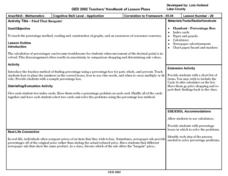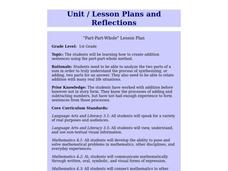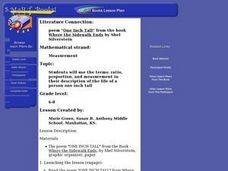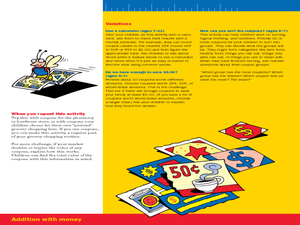Curated OER
Find That Bargain!
Students explore the methods of calculating percentages, reading and the construction of graphs, and an awareness of consumer concerns in this lesson. The movement of the decimal point often results in uncertainty and confusion. This...
Curated OER
Everything was Up to Date in 1628
Students examine the life and lifestyles of New England colonists in the year 1628, and then investigate what life was like in their own area during the same time period. They watch segments from the PBS hands-on history series COLONIAL...
Curated OER
Number Tick Tack Toe
Pupils practice basic addition and subtraction facts to twelve. They use high level thinking skills to win at the game of tick tack toe. Students review the rules to the game. They use strategy skills to master the game.
Curated OER
Estimating With Fractions
Seventh graders, exploring methods to estimate fractions, take notes on estimating fractions, 7th graders write letters to explain the process of estimating fractions and mixed numbers to someone who does not know the concept. Students...
Curated OER
Part-Part-Whole
First graders work with partners, using cubes to make addition sentences. In this math lesson, 1st graders separate cubes into 2 parts and discuss the relationship to addition sentences. Students practice separating cubes. Students make...
Curated OER
Building Log Cabins
Fourth graders design and create a log cabin in this lesson. They use ratios to help make dimensions of a house. They draw out how they want their house to look and gather the materials they need to complete the house. The log cabins...
Curated OER
New Cars? Selecting and Financing
Twelfth graders determine probabilities of real-life events such as life expectancies, winning a lottery ticket, and the break-even premium. They deduce what percent of markup is. Students are able to compare terms for financing a car...
Curated OER
Areeas of Parallelograms and Triangles
Twelfth graders are able to deduce the area of polygons by using several methods such as coordinate method. They are able to apply the area of polygons to real life situations. Students apply the Pythagorean Theorem in problem solving...
Curated OER
Fractions in the Kitchen
Seventh graders use the World Wide Web for research, identify fractions found in everyday life by finding a recipe that uses fractions.
Curated OER
Terrific Tessellations
Students create, transform, and critique their own piece of artwork. In doing this lesson, students get more experience working with angles, lines, and measurement. They gain experience seeing, and creating their own patterns and shapes.
Curated OER
Fair Haven Community and the Grand Avenue Bridge
High schoolers use the internet to research the history of Fair Haven, Connecticut. In groups, they are introduced to the socio-economic developments and how the area has grown over time. They work together to create their own bridge...
Curated OER
The Mesozoic Era
Sixth graders recognize that the Earth was different in different eras. In this Mesozoic Era activity, 6th graders compare the time frame of the different eras and how long they lasted for by graphing them. Students study the...
Curated OER
Methods of Mystery
Students utilize the scientific method to discover the age of an item. In this historical dating lesson plan, students compare and contrast a 400 year old cabinet to one made within a few years by using carbon dating. Students complete...
Curated OER
Using Inequalities to Problem Solve
Students explore inequalities. For this Algebra I lesson, students solve and graph linear inequalities involving addition, subtraction, multiplication, or division. Students use inequalities to solve and graph real-world problems.
Curated OER
The Royal Cubit
Pupils explore the history of measurement in ancient Egypt. For this math lesson, students discuss the development of a standardized measurement system. Pupils measure using various units and discuss the results and the need for a...
Curated OER
Money
First graders explore money. For this coins value lesson, 1st graders discover the values of all the U.S. coins and practice arranging them in order to buy objects. They will play a game as a class to practice the skill of using money to...
Curated OER
poem "One Inch Tall" from the book "Where the Sidewalk Ends" by Shel Silverstein
Students use the terms: ratio, proportion, and measurement in their description of the life of a person one inch tall.
Curated OER
Create Koi Nobori: Carp Kites
Students study the Japanese art of Koi Nabori or carp kites. They create their own carp kites with repeating patterns.
Curated OER
Bagel Algebra
Ninth graders apply proportional reasoning to a real-life situation. In this Algebra I lesson, 9th graders explore a series of equations that relate to a display sign that compares the owner’s bagels to competitors bagels. Students...
Curated OER
Radiation Reassessed
Young scholars investigate the dangers of radiation by exploring recent nuclear tragedies. In this scientific debate activity, students define the idea of radiation "half life" and determine if low doses of radiation are truly damaging...
Curated OER
How Much Do We Save?
Students use coupons to save. In this saving lesson students practice their addition, multiplication and estimating skills with dollars and cents. They investigate grocery coupons and look for ways to save money.
Curated OER
Slip Slide'n Away
Students analyze the sliding of boxes along a warehouse floor. In this algebra lesson, students connect math and physics by calculating the friction created by the sliding of each box. They develop faster method to move the box, based on...
Curated OER
Classifying Pyramids
Students study pyramids. In this prisms lesson, students explore the attributes of pyramids. Students will explore the lateral surface area of pyramids and be able to distinguish pyramids from other space shapes.
Curated OER
Wildlife Sampling-Capture-Recapture
Seventh graders simulate the capture-recapture method of population sampling using beans. In this biology lesson, 7th graders calculate the total population of beans in the bowl. They assess whether this method is reliable or not.

























